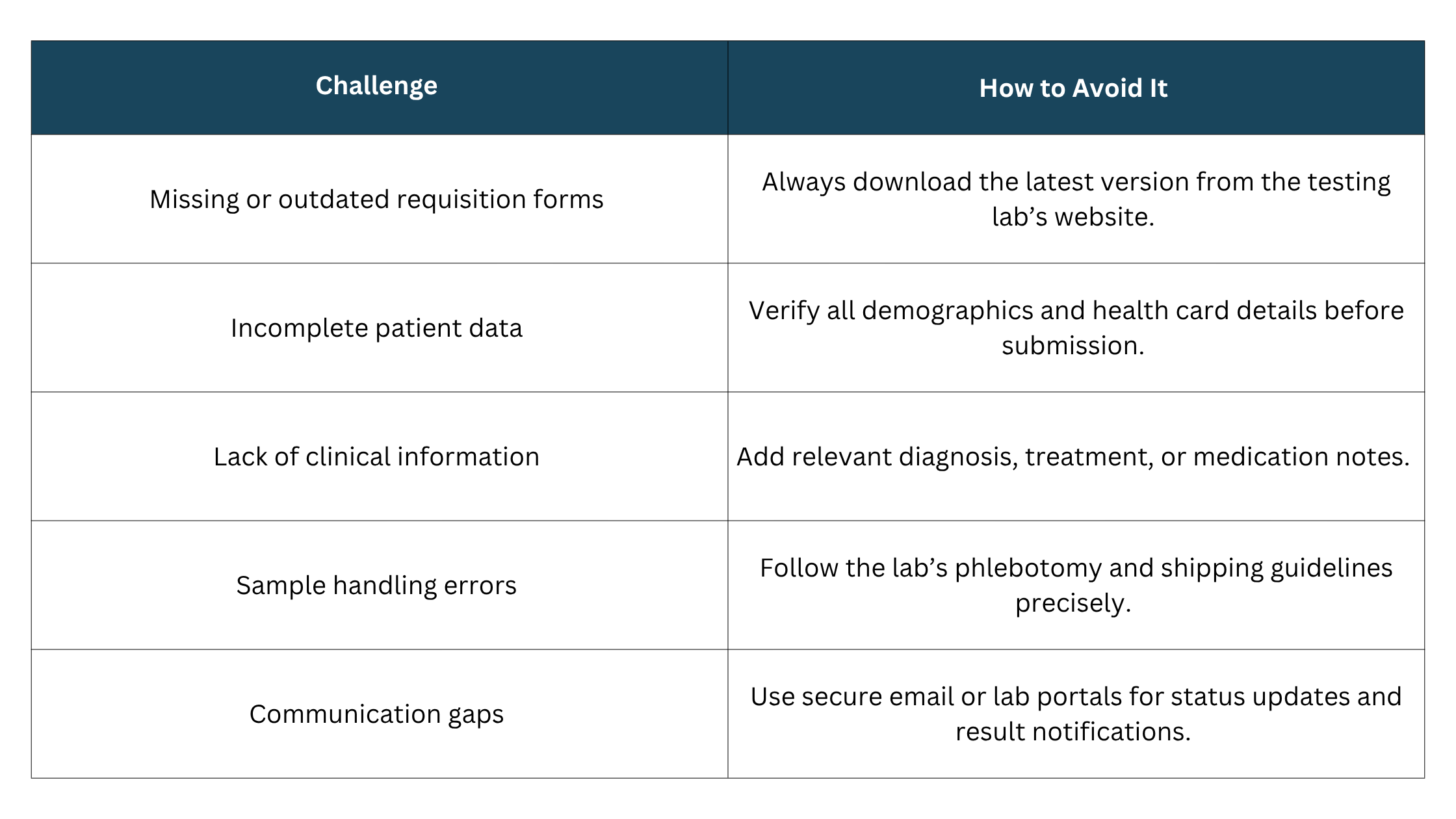How to Manage Laboratory Requisitions for Specialized Testing
Blood test requisitions are the foundation of every diagnostic process. While they may seem routine, accurate requisition management is especially critical for specialized testing such as genomic profiling, immunology assessments, or pharmacogenetic (PGx) analysis. In these cases, even small errors can affect sample validity, turnaround time, or test accuracy. At OncoHelix, we work closely with healthcare providers to streamline laboratory requisitions for complex testing, ensuring every patient sample receives the precision and care it deserves.
Understanding Specialized Laboratory Requisitions
A laboratory requisition form is more than just paperwork, it’s a medical test request that communicates essential patient information, test codes, and clinical context between healthcare providers and the diagnostic lab.
For routine bloodwork, a standard requisition may suffice. But for specialized diagnostic testing, such as molecular or pharmacogenetic panels, these forms must include additional details to guide analysis and interpretation.
Specialized testing requisitions often support services like:
Cancer Genomic Profiling for tumour mutation analysis
Pharmacogenetics (PGx) to assess medication compatibility
Serenity NIPT for prenatal screening
By completing requisitions accurately, clinicians help ensure that testing aligns with patient needs and clinical objectives.
The Importance of Accuracy in Requisition Forms
Accurate requisitions are crucial for maintaining diagnostic lab service quality and compliance.
Incomplete or incorrect information can lead to:
Testing delays or sample rejection
Misinterpretation of results due to missing clinical context
Duplicated tests or increased costs
Providing the right information at the start, including patient demographics, physician identifiers, diagnosis codes, and relevant clinical notes, supports a smooth process from phlebotomy to analysis.
Peer-reviewed research shows that the pre-analytical phase accounts for approximately 46–70% of total laboratory errors, highlighting how vital this stage is for overall diagnostic accuracy (Plebani, 2012).
Best Practices for Managing Specialized Test Requisitions
1. Use the Correct Laboratory Requisition Form
Each specialized test often requires a unique form or portal submission. Using the correct version ensures the lab receives all necessary information. At OncoHelix, test-specific requisitions and submission details are available on each service page, including Cancer Genomic Profiling and Pharmacogenetics (PGx).
2. Provide Complete Clinical Context
For molecular and immunological tests, clinical context is key. Include details such as:
Diagnosis and relevant medical history
Treatment plans or medication lists
Prior test results or family history
This information helps the lab select the correct type of test and interpret the results accurately.
3. Ensure Proper Sample Collection and Handling
Following the correct phlebotomy procedures and venipuncture protocol is vital.
Use appropriate collection tubes (e.g., EDTA for genetic samples).
Label samples clearly with patient ID and requisition number.
Store and transport samples according to temperature requirements.
The World Health Organization’s Guidelines on Drawing Blood outline practical recommendations for phlebotomy and specimen handling that reduce pre-analytical risks (World Health Organization, 2010).
4. Confirm Authorization or Consent Requirements
Some specialized tests, such as pharmacogenetic or NIPT panels, may require patient consent or insurance pre-authorization. Verifying this before submitting the requisition helps prevent administrative delays.
5. Track Submissions Electronically
Digital tracking ensures efficiency and transparency. Clinicians can record requisition numbers, submission dates, and sample shipment details in secure electronic medical record (EMR) systems or OncoHelix’s submission portal. This supports better coordination between the clinic and the diagnostic lab team.
Common Challenges and How to Avoid Them
Even experienced clinicians encounter obstacles when managing specialized requisitions.
Here are a few common issues and solutions:
By taking a structured approach, clinicians can help maintain the accuracy, speed, and reliability that advanced diagnostics require.
Frequently Asked Questions
Below are answers to common questions clinicians may have when preparing specialized requisitions.
1. Can I use a standard blood test requisition for specialized testing?
No. Specialized testing, such as genomic or pharmacogenetic panels, requires its own requisition form with additional fields for clinical and genetic details.
2. What information is required on a molecular diagnostics requisition?
Include patient demographics, relevant medical history, diagnosis, test code, and any current medications that could impact analysis.
3. How can I submit a requisition to OncoHelix?
Clinicians can submit requisitions directly through the test-specific pages on the OncoHelix website or by contacting the laboratory for guidance on electronic submission.
4. What should I do if I’m unsure which test to order?
Reach out to the OncoHelix team for guidance on selecting the most appropriate test for your patient’s clinical situation.
Conclusion
Accurate and efficient management of specialized blood test requisitions is key to ensuring meaningful diagnostic outcomes. Each form, sample, and submission contributes to the bigger goal, advancing patient care through precision medicine.
For more information about submitting requisitions or to discuss your testing needs, contact OncoHelix.
References
Plebani, M. (2012). Quality indicators to detect pre-analytical errors in laboratory testing. Biochemia Medica, 22(2), 179–190. https://pmc.ncbi.nlm.nih.gov/articles/PMC3428256/
World Health Organization. (2010). WHO Guidelines on Drawing Blood: Best Practices in Phlebotomy. https://www.who.int/publications/i/item/9789241599221
College of Physicians & Surgeons of Alberta (CPSA). (2023). Lab Requisitions – Advice to the Profession. https://cpsa.ca/wp-content/uploads/2023/11/AP_Lab-Requisitions.pdf



